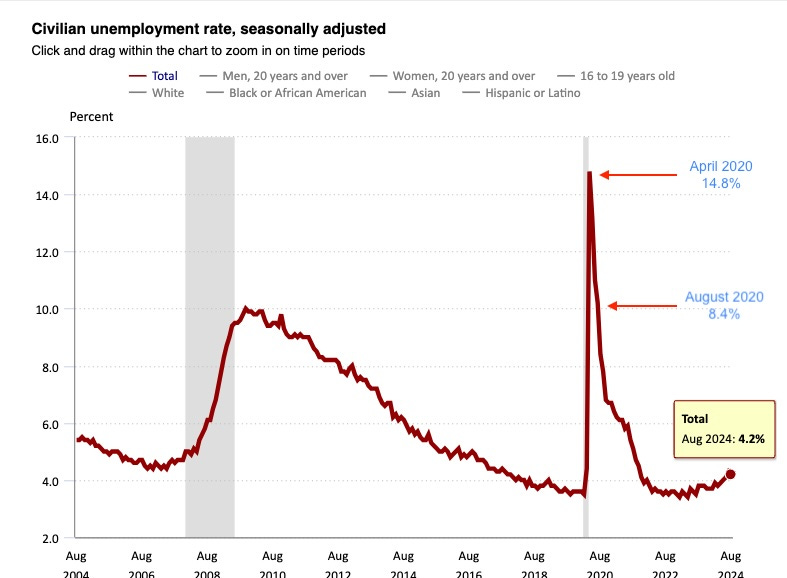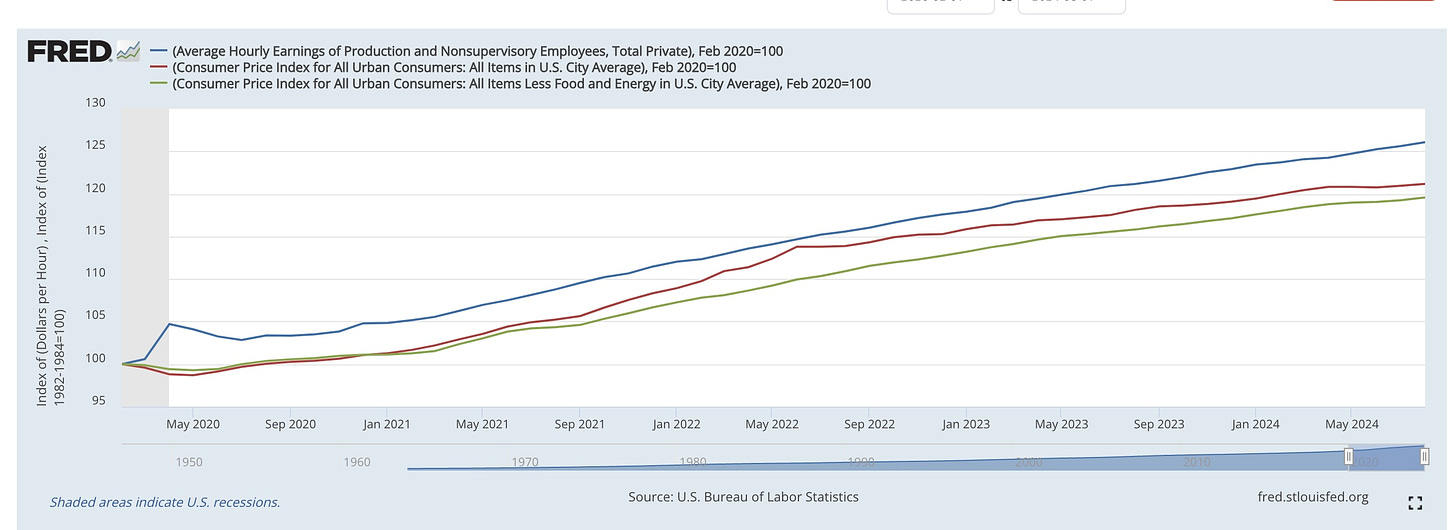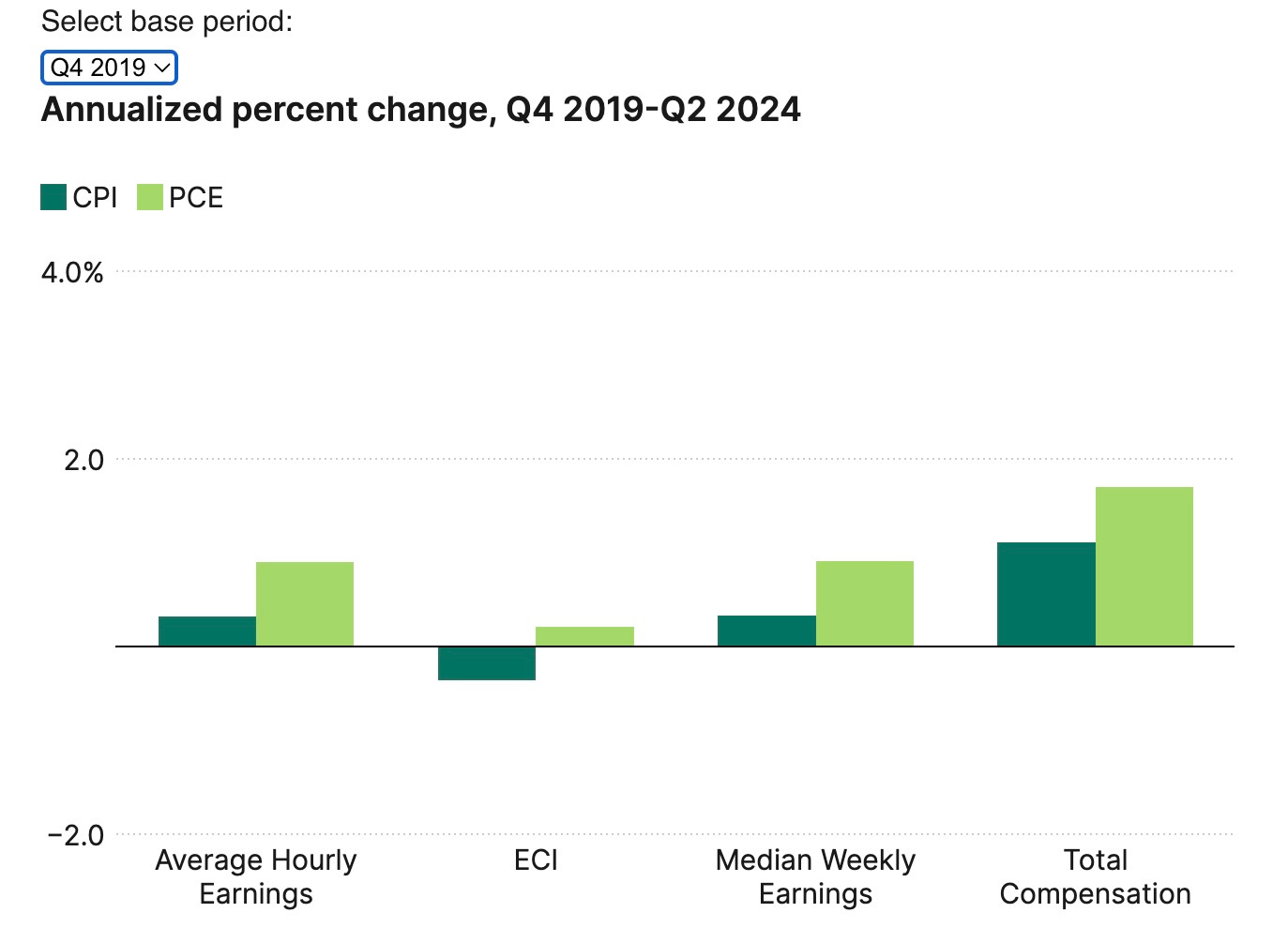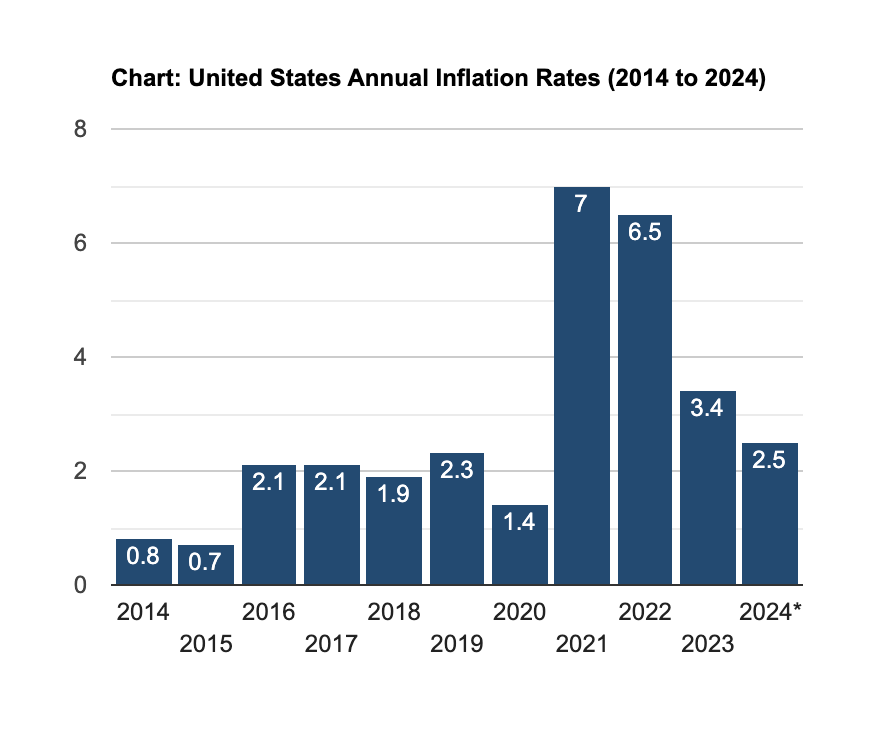Election Countdown, 43 Days to Go: ‘Are You Better Off?’
We'll hear the question more and more in these remaining days. Here are some facts for a response.
Forty-four years ago, the challenger Ronald Reagan greeted the incumbent Jimmy Carter at their only debate of the 1980 campaign. Reagan’s closing statement in that debate is remembered for the now-standard query, “Are you better off than you were four years ago?” Jimmy Carter didn’t have a chance to respond that evening. The Democrats need to be ready to respond now. (Getty Images.)
The purpose of this post is to provide some benchmark facts for the most familiar question as presidential campaigns near their climax: “Are you better off than you were four years ago?”
I do this in full awareness of two limits on how much such facts matter. One is the gap between how things are, and how they feel. That’s the theme of America’s recent “vibe-cession”: The economic trends and numbers have been up, but views of “the economy” have been down. This gap obviously affects any “are you better off?” assessment.
The other limit is that, at this point in the campaign, there is only so much that details and data can do. If you don’t know who Donald Trump is by now, or what’s different between his outlook and Kamala Harris’s, another chart isn’t going to break through.
Still, facts should matter—if for no other reason than to help us judge how far “feelings” and campaign myths have departed from them. Here are some facts and realities that I have found useful in judging the “better off” question. I’ll start with economic and financial ones, since they’re usually where elections are won or lost. Then some social and cultural indicators.
‘It might be well if you would ask yourself…’
First, the drama of how “are you better off?” became an ingrained part of today’s presidential campaigns. It happened on the evening of October 28, 1980, just one week before election day.
That night, Ronald Reagan, the Republican challenger, met in Cleveland with Jimmy Carter, the beleaguered Democratic incumbent, for their one and only debate. Reagan won the coin toss to get the final words. He looked at the camera and near the end of his closing statement said this:
Next Tuesday all of you will go to the polls; you'll stand there in the polling place and make a decision. I think when you make that decision, it might be well if you would ask yourself: Are you better off than you were four years ago?
He went on with a list of comparisons—retail prices, unemployment rates, international tensions—all of which had in fact gotten worse on Carter’s watch, during an era of worldwide runaway inflation. He concluded by saying that some people might answer Yes to “are you better off?” For them, he said, “I think your choice is very obvious”—with a quick nod in Carter’s direction. But for those who answered No, “then I could suggest another choice that you have.” This last line was given with a trace of a smile.
Two weeks ago, David Muir of ABC News led off the questioning of Kamala Harris with the same question: “When it comes to the economy, do you believe Americans are better off than they were four years ago?” Harris never answered directly—those first few minutes were her most uncertain-sounding part of the debate, before she found her commanding stride.
What could she have said? On his Substack site, the economist and debate expert1 Robert Litan has a fascinating series of suggested answers, should she ever debate Trump again.
Now some facts.
We’ll start with finance and the economy, and then go into cultural and social issues. In each case I’ve looked for the most recent credible data, which is generally from last month, August, 2024, and then gone back to compare it with four years earlier, August 2020. Some of them are for under-publicized “better off” achievements. Others for “worse off” situations that Democrats should be prepared to explain rather than avoid. Here we go.
Unemployment.
—Aug 2020: 8.4%
—Aug 2024: 4.2%
Better off? Yes, certainly.
Those numbers are from the Bureau of Labor Statistics. They’re the basis of charts like the one below, whose annotations I’ll explain.
A few months into the pandemic, in April 2020, unemployment spiked to its modern peak of 14.8%. By August 2020, commercial re-opening and government stimulus had brought the rate down to 8.4%. This August, four years later, it is half that level, 4.2%—up slightly from its Biden-era low of 3.4% mainly due to the Fed’s efforts to cool down the economy.
Are Americans better off because of this change? By a mile. The worst thing that can happen to an economy is widespread layoffs and unemployment. Inflation is bad, but anyone who has lived through times of severe joblessness knows that it is worse—for communities, families, and the country.
Real wage increases: Getting ahead of inflation, or falling behind?
Better off? Yes, surprisingly.
The chart below, from the Federal Reserve Bank of St. Louis, plots how wages have compared with price increases over these past four years. It looks complicated but its message is simple: Pay has gone up faster than prices over these past four inflationary years. Based on buying power, most people are better off.
The blue line on this chart shows how wages have risen from a baseline four years ago. The green and red lines are two different measures of price increases in that same period, from the same baseline.
The blue line—pay—has kept ahead of the red and green lines all the way along. Of course this varies family by family, region by region, job by job. But overall American workers have, again, moved ahead of inflation, rather than falling behind.
Here’s another version of the same data, from Brookings. You can read the details at their site, but the essence is: the light green bars show increases in earnings over the past four-plus years. Dark green shows increases in prices.
In all cases, the light green is bigger. In real terms average Americans received a boost in pay.
Inflation.
—Aug 2020: 1.3%
—Aug 2024: 2.5%
Better off? No, but improving.
Inflation has been the main economic problem in these four years, for the US and around the world. Here is a bar chart of annual rates, based on data from the BLS and the Labor Department via USInflationCalculator.com.
The problem was serious. It is getting much better.
Stock market.
—Aug 2020: 3363, the month-end closing value of S&P 500
—Aug 2024: 5618, a rise of 67%.
Better off? Yes, dramatically.
The stock market is not the economy. When it goes up it disproportionately benefits those who are already best-off.
But according to Gallup, more than 60% of Americans say they have stock holdings, mainly through mutual funds and retirement accounts. And stock market crashes and financial panics can hurt people at every economic level. Think back to the years-long scourge of job losses, foreclosures, and business shutdowns after the financial collapse of 2008. If there’d been a similar collapse in these past four years, we’d be hearing about it nonstop in Republican “better off” questions.
Monthly Covid deaths.
Aug 2020: 29,911 according to the CDC.
Aug 2024: 4,309
Better off? Yes, for sure.
We move now away from the strictly economic. Most Americans know the complications of this topic, and the controversies about assessing responsibility for it. Most Americans have direct experience with tragedies and losses from this pandemic, which continue. Every loss brings heartbreak. But we are better off as a country with so many fewer losses than four years ago.








